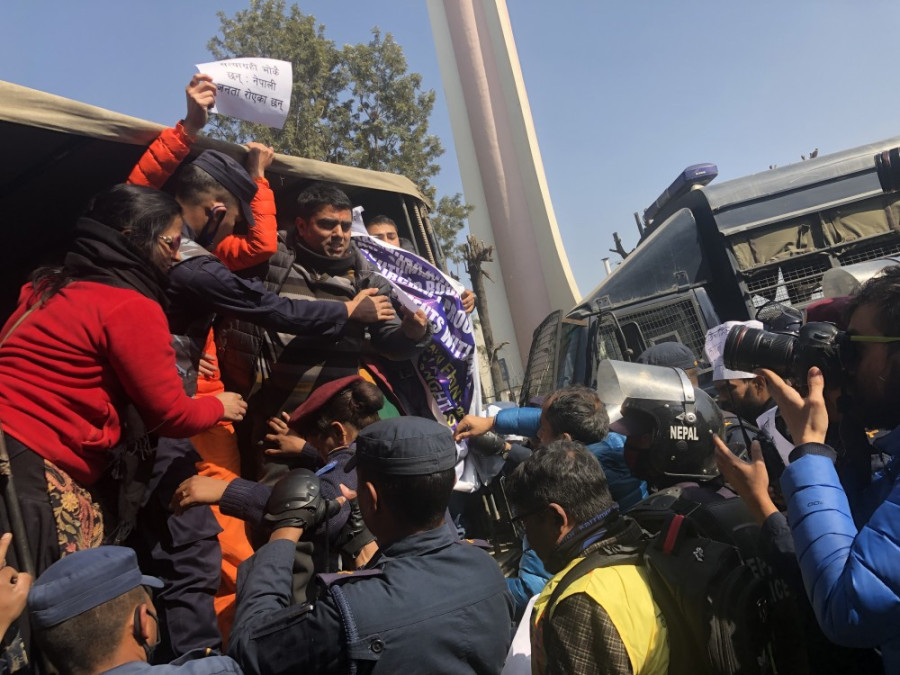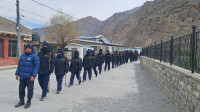Politics
People in Nepal are not enjoying their civil rights and political freedoms, new human rights report says
The KP Sharma Oli administration has been visibly attempting to limit freedom of expression through laws and policies, rights advocates say.
Bhrikuti Rai
Civil liberties in Nepal are increasingly coming under threat, with greater policing of social media and proposed laws that will limit freedom of expression, says a new human rights survey.
The survey, conducted by the New Zealand-based Human Rights Measurement Initiative, said that Nepal’s low score of 3.9 out of 10 on freedom of opinion and expression is “very concerning.”
“Nepal’s Empowerment score of 5.6, based on a detailed survey of human rights experts, tells us that many people in Nepal are not enjoying their civil rights and political freedoms,” the report says. The empowerment category in the report includes right to assembly and association, right to opinion and expression, and right to participate in government.
Journalists and young people, including artists and singers critical of the government as well as human rights defenders and those working on transitional justice issues, were listed as among the most “vulnerable” to restrictions on their rights to expression and opinion by the government.
The bleak picture of declining civil liberties comes just a week after the police pursued action against a Facebook page for a movie review, and a month after national and international civil liberties groups pointed out declining press freedom in Nepal.
In the 2019 World Press Freedom Index published by Reporters Without Borders, Nepal’s position has remained unchanged at 106, after falling six places in 2018.
The sense of shrinking liberties has become a cause for concern for many, as the KP Sharma Oli administration has pushed a number of controversial bills in Parliament, like the Media Council Bill, bill to amend the National Human Rights Commission Act, and IT Management bill, without sufficient public consultations.
The National Security Policy, which was endorsed by the Cabinet in March, also hasn’t yet been made public, even though it could have serious ramifications on civil and political rights. Political analysts and rights advocates say this kind of secrecy surrounding governmental policies are signs of creeping authoritarianism.
“Any critical voice, whether it is calling out corruption by government ministers or questioning proposed laws, is seen as a challenge to the regime,” said Vijay Kant Karna, a political analyst and former ambassador.
And it isn’t just analysts like Karna who have been calling out the current government’s draconian laws. Last month, at a lively interaction in the Capital, human rights advocates, journalists, and civil society members expressed fear and concerns about Nepal possibly inching towards authoritarianism.
“When there is elected authoritarianism, then we, the people, begin censoring our thoughts, expressions, and the right to assemble,” said political columnist CK Lal, who was one of the speakers. Speakers and audience members said that the Oli administration has been nakedly attempting to stifle journalists and freedom of expression through its laws and policies.
Minister of Communication and Information Technology Gokul Baskota has repeatedly admonished the press in public and in private for critical coverage of the current government.
Last year, Baskota ordered state media to muzzle-and counter-news items related to Nirmala Pant, a 13-year-old girl from Kanchanpur who was raped and murdered, and Dr Govinda KC, who was then staging a hunger strike demanding reforms in medical education. The minister summoned editors of five state media outlets and asked them to effectively discredit and mitigate the private media’s trenchant coverage of the government’s inaction in both cases.
“This government has misread the people’s mandate, instead of promoting and protecting the constitution, it’s doing the opposite,” an audience member said impassionately. “The constitution is being hijacked in a calculated way, we need to break the culture of silence.”
But the government has repeatedly defended its decisions, especially with regard to media laws and policies, saying no one can overstep the constitution.
Speaking to the Post, lawmaker Kalyan Kumari Khadka from the ruling Nepal Communist Party, and chair of the development and technology parliamentary committee, which is currently reviewing the controversial IT management bill, said, “We aren’t trying to curtail freedom of expression with the proposed IT bill. We are only trying to regulate the IT sector to create a more dignified society.”




 10.41°C Kathmandu
10.41°C Kathmandu















